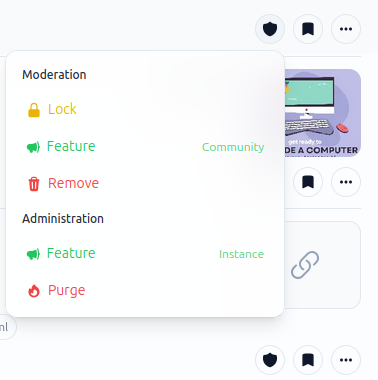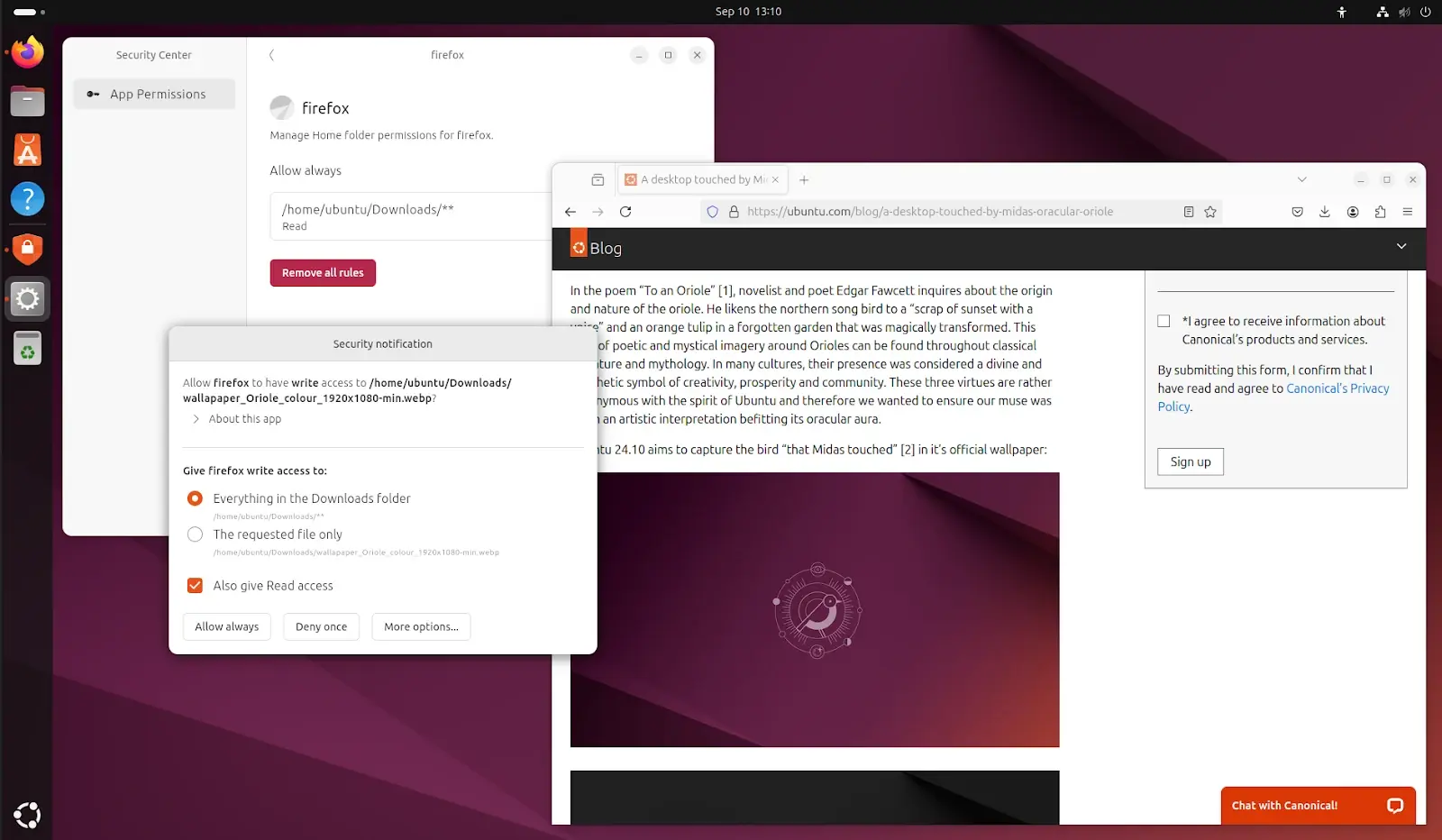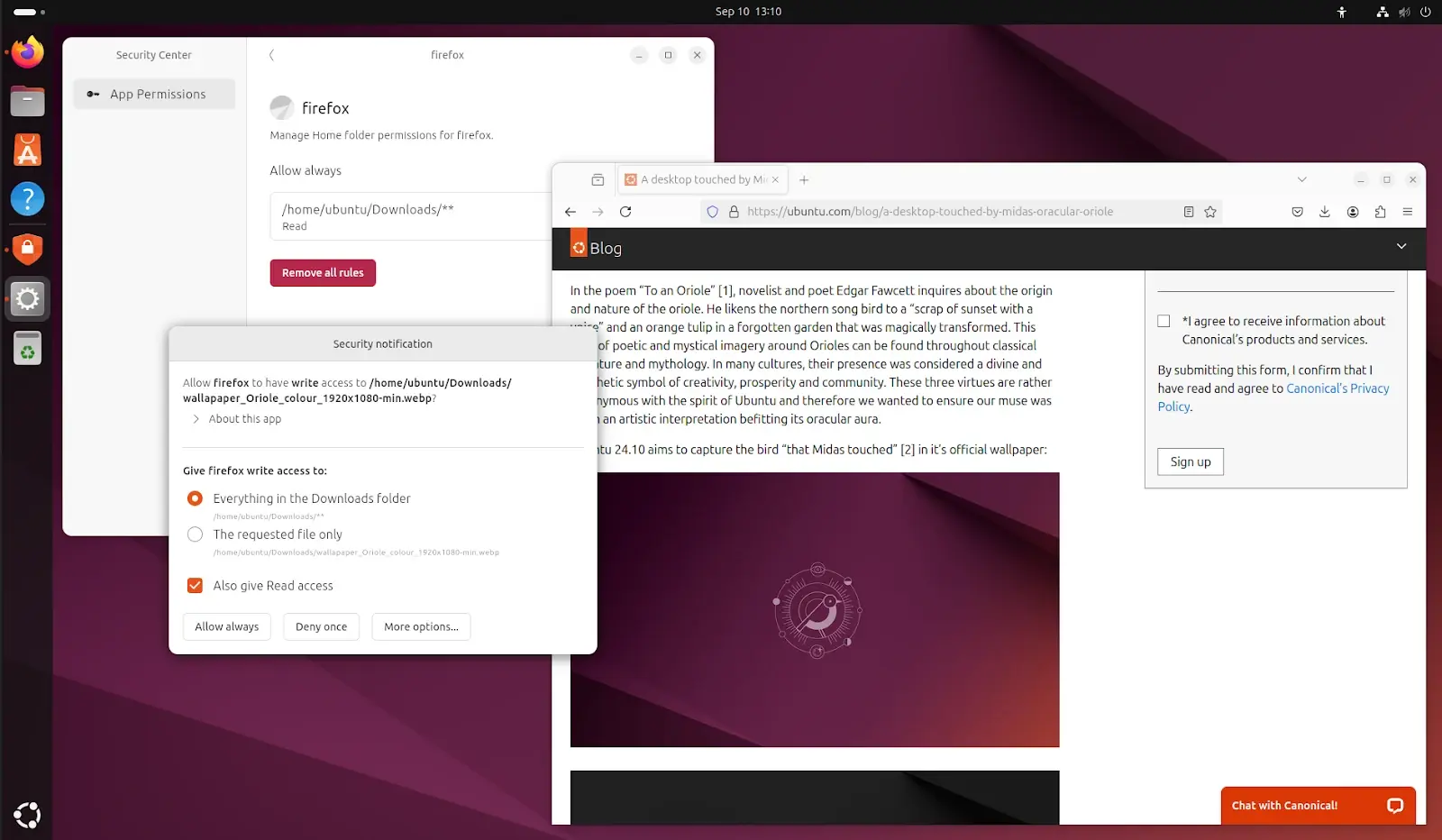- 292 Posts
- 199 Comments

 67·10 days ago
67·10 days agoThis is a great summary. Thanks!

 19·11 days ago
19·11 days agoIt looks like you are running XFCE instead of GNOME (the normal Ubuntu desktop). I’m not sure how that happened… but you an always just install another desktop.
For instance, you can try to make sure you have the
ubuntu-desktoporubuntu-desktop-minimalmetapackage installed:sudo apt install ubuntu-desktop-minimalAfter that, the login manager should allow you to select the Ubuntu session rather than the XFCE one.

 4·17 days ago
4·17 days agoYes, based on the diagrams on their blog, it looks like this only impacts Snaps.

 12·17 days ago
12·17 days agoFrom the Discourse Blog:
The Linux desktop provides XDG Desktop Portals as a standardised way for applications to access resources that are outside of the sandbox. Applications that have been updated to use XDG Desktop Portals will continue to use them. Prompting is not intended to replace XDG Desktop Portals but to complement them by providing the desktop an alternative way to ask the user for permission. Either when an application has not been updated to use XDG Desktop Portals, or when it makes access requests not covered by XDG Desktop Portals.
Since prompting works at the syscall level, it does not require an application’s awareness or cooperation to work and extends the set of applications that can be run inside of a sandbox, allowing for a safer desktop. It is designed to enable desktop applications to take full advantage of snap packaging that might otherwise require classic confinement.
So this looks like it complements and not replaces the XDG Desktop Portals, especially for applications that have not implemented the Portals. It allows you to still run those applications in confinement while providing some more granular access controls.

 1·19 days ago
1·19 days agoAs a moderator, you should see a “shield” on a post and from that sub-menu, you can choose to feature or unfeature a post:


 4·19 days ago
4·19 days agoI used to use VLC for music, but these days I use Symphony to play local files on my phone. VLC tended to struggle when scanning or indexing large folders (which it did all the time…), while Symphony is a bit better at that. That said, I still use VLC for video and for casting things from my DLNA server (VLC supports Chromecast).
For ebooks, I’ve used Librera FD and that has been mostly OK. I’ll checkout the two you mentioned though. Thanks!

 2·21 days ago
2·21 days agoHoly hurdle! TY J-LOVE!

 18·23 days ago
18·23 days agoI think you meant Pop!_OS (is developed by System76). TuxedoOS is developed by Tuxedo Computers, which is a European Linux focused hardware company.
That said, the point stands… there are hardware companies making Linux supported devices.
 1·26 days ago
1·26 days agoFor a simple IRC web client, I would also add Gamja, which I self-host along side with the Lounge (mentioned in the article) for a few users.
That said, my primary client is WeeChat and WeeChat-Android.

 2·30 days ago
2·30 days agoLooks like Bison > Buffalo… for now.
I’ve been using Weechat-Android to connect to my self-hosted Weechat for over a decade. This is one of the killer mobile apps that keeps me on Android and I love it.
I also have a couple instances of thelounge that people use on mobile via the PWA (progressive web app).

 6·1 month ago
6·1 month agoOh. I’m sorry if this was discussed previously… I only returned to lemmy a few weeks ago and didn’t see the story covered yet.

 32·1 month ago
32·1 month agoI think the WINE project was maintaining a fork of Mono that was used to support running certain Windows applications:
So in addition to translating traditional WIN32 system calls, WINE also supports .NET applications, which a number of Windows programs require.

 11·1 month ago
11·1 month agoCoincidentally, I received a firmware (EFI) update from Dell today via LVFS. Really nice that it works so smoothly on native Linux (no more manually downloading firmware to USB drives, or relying on Windows).

 40·1 month ago
40·1 month agoThe reasons for this shift in budget away from funding Free Software and the NGI initiative seems to be an allocation of more funds for AI, leaving internet infrastructure by the wayside. Meanwhile, the EC has thus far declined to comment to share its official reasoning for striking this funding from its budget.
Sigh. It appears that they are chasing after the latest “shiny” thing instead of investing in existing infrastructure. Not surprising, but disappointing.

 8·1 month ago
8·1 month agoPretty happy that we opted out of the Slack AI “feature” at work.
+1 For xournal++. That is what I usually use for annotating slides and drawing with my wacom tablet.
I agree that the amount of work for many students can get quite out of hand and to be honest when I first started teaching, I was pretty guilty of having very work intensive courses.
That said, over the years, I’ve worked to streamline my courses to only have what I believe to be absolutely critical to learning and have added a lot of scaffolding and automated tests (for immediate results). In general, I try to have no busy work and make sure everything assignment is meaningful (as much as it can be anyway).
Additionally, because I understand that sometimes life happens, I have built-in facilities for automate extensions for assignments and even have a system for dropping certain homeworks.
This not to say that there isn’t work in my classes… it’s just that the work is intended to be relevant and reasonable, which most students seem to agree with these days.
I think students should be expected to work less over a longer period of time.
I think this would be a great idea. Or rather, I think it would be great to allow students to learn at different rates… some may want to go faster, some may want or need to go slower.
I think the modern course-based education system is often too rigid and not flexible enough to adequately accommodate the needs of students with different experience levels, resources, or constraints. Something like a Montessori model would be a lot better IMHO.






















Looks like a number of patches are landing in Ubuntu to address this: https://bugs.launchpad.net/ubuntu/+source/cups/+bug/2082335
Update: CUPS Remote Code Execution Vulnerability Fix Available